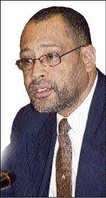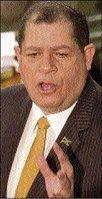Independence of powers
Published: Sunday | November 15, 2009

Robert Buddan
Back in the 1990s, Edward Seaga's Jamaica Labour Party (JLP) proposed that Jamaica's central bank be independent from the executive and a constitutional provision be made to balance the Budget in order to curb deficit spending by the executive. This was to be the basis for a low-inflation, low-growth strategy.
Bruce Golding was a part of that JLP, but he left to form the National Democratic Movement (NDM) where he complained that the prime minister exercised too much power in the Westminster system. We should have an American-type separation of powers system, he said. What is the state of things under Golding and the JLP now that they are in power?
The Westminster model is built around the concept of independence of powers between the government, judiciary and civil service. The central bank's independence is not guaranteed. In effect then, Seaga was proposing a modification to the model to ensure the independence of the central bank. The argument became somewhat popular and some suggested that currency boards worked better than central banks to contain inflation because they could not print money.
independent banks



From left: Seaga, Latibeaudiere and Shaw
The Westminster model sits very uneasily with central bank independence. One scholar of the Westminster model pointed out that "central banks are responsible for monetary policy and independent banks are widely considered to be better at controlling inflation and maintaining price stability than banks that are dependent on the executive. However, central bank independence is clearly in conflict with the Westminster model's principle of concentrating power in the hands of the one-party majority Cabinet".
The People's National Party (PNP) had not accepted that the central bank should be independent, but had nonetheless allowed it to act with greater autonomy. Such an understanding existed under Omar Davies and Derick Latibeaudiere and inflation was held to single digits for much of their dual tenure. In fact, after we ended our borrowing relations with the International Monetary Fund (IMF) our fiscal deficit was coming down and we were on the eve of balancing the Budget when financial irresponsibility by corporate Jamaica caused the massive bailout for which we are still paying.
Understanding
The issue now seems to be less about whether the central bank should be independent and more about what the understanding is between the finance minister and the central bank governor about strategy. In the case of Audley Shaw and Latibeaudiere, we never knew. We now hear that there was a difference between Shaw's fiscal strategy and Latibeaudiere's monetary strategy. That is what the press says.
That is not what the Government says, which makes the matter more mysterious. Golding said that Latibeaudiere was being paid too much. Mark Golding, PNP spokesperson on commerce said this was a sideshow. The contract could have been renegotiated and as Ralston Hyman said, if it was about pay then the Government could have fired Mr Latibeaudiere at any time and should not have done so in the midst of his negotiations with the IMF.
Golding has turned the JLP's policy or position for an independent central bank on its head and done what he himself complained about - demonstrating the all-too-powerful nature of the executive's dominance in the Westminster system. What is worse is that this dominance has been exercised in such a reckless and irresponsible way. Golding has used his Westminster powers in a way that it was not intended to be used. It was intended for him to respect the principle of independence of powers. Even if the central bank was not legally independent, its integrity and the professional independence of its governors should be respected.
From around 1997, the British Cabinet began to allow that country's central bank more independence. In Jamaica, too, the Bank of Jamaica was being allowed greater autonomy around that time. The same Latibeaudiere was behind the timely lowering of interest rates to single digits before it moved back up. To say that he is resisting lower interest rates as a dogma is to misrepresent his record. It seems there was more than any difference of strategy behind our failure to conclude an IMF agreement.
In fact, in just seven months we have had four lead negotiators - Don Wehby, Sharon Crooks, Latibeaudiere and currently Wesley Hughes. By December, we might have a fifth, the new BOJ governor, Brian Wynter. In the coming and going of these able persons we heard nothing about differences of strategy and we still did not have an IMF agreement.
NEW EQUATION
The founders of the Westminster model had not anticipated how it would work in an environment in which a country like Jamaica had to do business with the IMF. The IMF has effectively become the fourth arm of government (see my article of August 30). What is the IMF's influence? Does the IMF now tell the executive what to do about the leadership and strategy of the central bank and does this undermine any possibility of central bank independence?
The first real hint of the IMF's influence came the day after Latibeaudiere's dismissal. Analyst Anne Shirley is reported to have said that Brian Wynter seemed to have been the "compromise" choice to satisfy the IMF. The Government could not have dismissed Latibeaudiere in the midst of negotiations with the IMF against the wishes of the Fund, or without the interest of the IMF one way or the other in the matter. After all, the dismissal had direct bearing on Jamaica's international credit rating, and indirectly, the negotiations themselves.
Damage had certainly been done. A week after Latibeaudiere's dismissal, Anne Shirley said government would not meet its schedule with the IMF and we "should have seen this since the dismissal of the central bank governor, Derick Latibeaudiere". The Government should have anticipated this connection.
Standard and Poor's downgraded Jamaica and cited Latibeaudiere's leaving as one of the reasons. It also spoke to uncertainty surrounding the negotiations and hence prescribed a negative outlook for Jamaica. It said, "The downgrade on Jamaica follows the resignation of the central bank governor, Derick Latibeaudiere, who was the lead negotiator within the framework of a possible standby facility with the International Monetary Fund." It continued by saying that these "recent events highlight the complexity of the negotiation process and create more uncertainty about the timeframe for reaching an agreement with the Fund". Moody's said it was "carefully monitoring developments".
downgrade
Peter Bunting said that if the downgrade increased our cost of borrowing by one per cent for one year we would end up with an additional $12 billion debt. Mark Golding said the Government is already $5 billion behind its recent supplementary budget's fiscal target. In the meantime, the dismissed governor will still have to be paid his salary up to July 2011, while a new governor is also being paid.
It seems that the executive has used its power excessively and irresponsibly. The situation is even worse if it is using that power to appease the IMF, which we cannot hold to account. There is a clear failure of professional behaviour on the part of the executive and the cost to the country brings us closer to what Moody's calls, restructuring, a euphemism for default.
Robert Buddan lectures in the Department of Government, UWI, Mona. Email: Robert.Buddan@uwimona.edu.jm or columns@gleanerjm.com.
